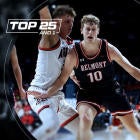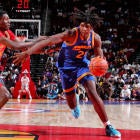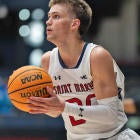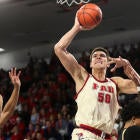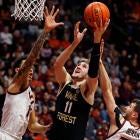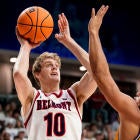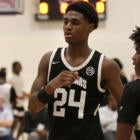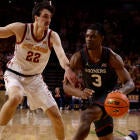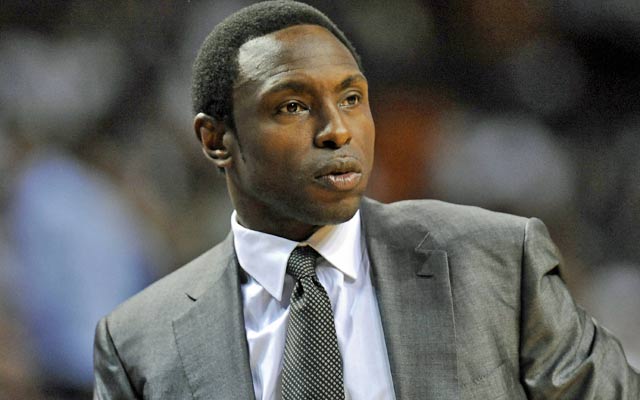
Avery Johnson is a man in transition. After over 25 years in the NBA, Johnson is now fully entrenched in college basketball as the new head coach at the University of Alabama. CBS Sports Network and CBSSports.com's Jon Rothstein sat down with Johnson to discuss his first month on the job in Tuscaloosa, what he learned during his time in the media over the past few years, and what style of play he hopes to implement with the Crimson Tide.
Jon Rothstein, CBSSports.com: So if someone told you two months ago that you'd be the head coach of an SEC school right now, what do you think your reaction would have been?
Avery Johnson: Wow. I would have asked that person, are you crazy? I was pretty comfortable at ESPN in doing what I was doing. I had my eyes on some NBA jobs and was tracking those, but I got a phone call gauging my interest in another high-profile college job and then I got this phone call from Bill Battle about this job. We then met and talked about everything here at Alabama and one thing led to another. But I would have said two months ago if somebody asked me that, are you crazy?
CBSSports.com: I know you're still getting acclimated to the University of Alabama, but what's the biggest thing you know about college basketball now that you didn't know prior to taking this job?
Johnson: Just the rules. The compliance handbook and manual about recruiting is almost 300 pages long. I know that a little better than I did before I took this job (laughs).
CBSSports.com: You were much more involved with the AAU scene following your tenure with the Nets in 2012. What was your initial impression of that world when you were exposed to it a few years ago?
Johnson: My initial impression was that every parent that you came into contact with thought their kid was an NBA player and wanted my assessment of their child whether he was in eighth grade, ninth grade, or tenth grade in terms of them potentially being a pro. That was pretty interesting. I enjoyed how the kids were sponges. They really wanted to learn. I was involved with the Houston Hoops program out of Houston and then heavily, heavily involved with the Texas Titans program out of Dallas where I had chance to coach their practices quite a bit and work one-on-one with those kids. The level of interest that the parents had in terms of their kids' potential in being pros was amazing, but at the same time the kids were just pieces of clay that wanted to be shaped and they were very coachable so that was a great thing to be a part of.
CBSSports.com: All coaches who have taken time away from the game in a television role have raved about how it allowed them to view things from a different lens. What's the biggest thing you gained from your time in the media?
Johnson: The information that you give the kids --- it can't be overload. I think what I gained is how to be a little bit more patient and knowing how to communicate information to kids and how to teach it to kids on this level. A lot of kids that are 19 years old --- their maturity level may be more like 17. A kid's 20, but the maturity level may be more like 18. Just knowing how to be patient, not only to teach and discipline kids, but also knowing how to teach and discipline kids because so many of these kids come from so many different situations.
CBSSports.com: You were involved with the NBA in some capacity for over 25 years and I know basketball is basketball, but what's the biggest difference you've noticed today between the college game in the professional level?
Johnson: I just think the NBA level --- the size and speed and the skill set of the guys on that level is different from the kids on the college level. A lot of the kids on the college level, they're not fundamentally sound yet. They're still a work in progress. The shooting and the offensive game on the college level is a little bit different. The game on the NBA level is a lot faster and guys are just bigger and stronger and faster and older. On one level, guys are getting paid to feed their families and on another level kids are on scholarship and going to class. It's just a difference in the professionalism between the college kids and the NBA players.
CBSSports.com: Your teams in the NBA were known for their defensive prowess, but you have said out of the gate at Alabama that one of your goals is to play fast. How do you achieve both?
Johnson: I think a snapshot of what I did in the NBA was to help teams improve defensively, but people tend to forget a lot of my teams in Dallas were pretty good offensively and we were more of a balanced team. That's what I want to try and achieve here. Just become more balanced where we're just not weighted towards the defensive end, but we want to play a lot faster and quicker. I've got to have players that can make the right decisions with the basketball. My new good buddy Nick Saban talks about it's all about the ball, the ball, the ball. You've got to have players that make great decisions with the ball. We're going to play a little faster and I think that adds a little more intrigue to a team. I'll keep trying to do things that will get our fans and our supporters a lot more excited about what we're doing on the floor.
CBSSports.com: You lose your top three scorers from a team that won 19 games this past season and there's no doubt that the SEC is an improving basketball league. What's going to be the biggest challenge in navigating things next season?
Johnson: I just think laying the foundation, changing the culture, and developing an identity. That's what is important to our team. We don't have an identity. We're not like some team that's trying to get their swagger or their mojo back after a period of success. We're trying to develop it all. I know in some ways we're going to have some growing pains, but this year is more of a transition year and we just need to try and be as competitive as we can be. I'll figure out the right speed and the right pace that we need to play. We'll figure out the strengths and weaknesses of our team. I'm still trying to add two to three more players to this current roster --- hopefully some players with experience because we have enough freshman and sophomores. We'll figure out a style of play that fits us the best and adjust accordingly and hopefully be able to win some close games that we didn't win last year.













